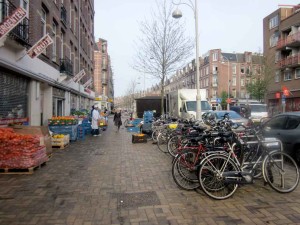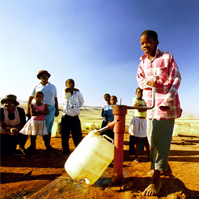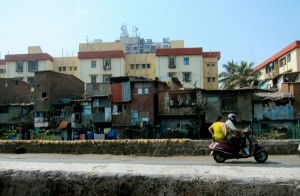
Indische Buurt – Amsterdam Photo: Zeynep Gunduz
This paper describes the methodology of budgetmonitoring and its operationalization via the project in the Indische Neighborhood. The 12-month pilot project was realized by The Centre for Budget Monitoring and Citizen Participation, in collaboration with E-motive, University of Applied Science in Amsterdam (HvA), MOVISIE and members of local communities in the neighborhood.
The launch of the Center for Budget Monitoring and Citizen Participation in the Netherlands
The idea to implement budget monitoring in the Netherlands was initiated by E-Motive of Oxfam-Novib. E-Motive connects knowledge and expertise from developing countries to Dutch professionals. In 2010, E-Motive introduced a group of social professionals in the Netherlands to INESC (Institute of Socioeconomic Studies), the expert on budget monitoring in Brazil. A year-long intense co-operation between active citizens and social workers from the Netherlands and INESC led to the launch of the Center for Budget Monitoring and Citizen Participation (Stichting Centrum voor Budgetmonitoring en Burgerparticipatie) in Amsterdam in December 2011.
The collaboration with INESC has played a significant role in developing the method of budget monitoring for the Netherlands. INESC has more than three decades of activism and research in Brazil and worldwide and believes that social participation is crucial in making governments accountable and promoting social justice. Since 1991, INESC has chosen public budget as a strategic tool to increase social participation in policy and in controlling the spending of budgets. INESC is specifically concerned with the allocation of public budget to promote social justice and human rights. They have developed their own methodology entitled Budget and Human Rights with the aim to verify the realization of human rights and their sustainability. Relying on education as a strategy, INESC targets schools located in poor urban neighborhoods (favelas) where they teach students the method of budget monitoring, the fundamental importance of active citizenship and influencing government policy.
INESC has achieved many positive results with this approach. One example is the ONDA project. Students participating in the project monitored the budget of their local government. They found out that two million reales was assigned for the renovation of their school. But the school never received the money. So the students attended a public hearing and managed to get an amendment for all public schools in the federal republic. Examples like this underline the strong impact that budget monitoring and civic participation can have on the allocation of public budgets.
INESC’s method was created for the context of Brazil and needed to be adjusted to the Dutch context. In comparison to INESC’s method, which focuses on human rights, our emphasis lies on social justice and civic participation. In addition, within the context of the Netherlands, the method of budget monitoring seems to fit active neighborhood organizations best as well as those communities that want to get a grip on the utilization of available resources in their neighborhoods.
Read more: http://rozenbergquarterly.com/?p=4991




